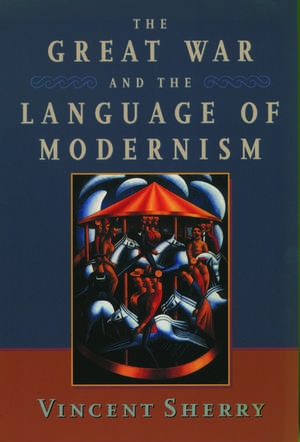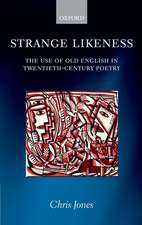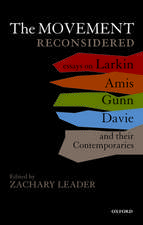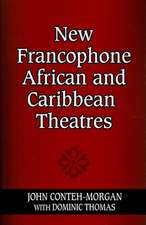The Great War and the Language of Modernism
Autor Vincent Sherryen Limba Engleză Paperback – 17 iun 2004
Preț: 267.15 lei
Preț vechi: 293.99 lei
-9% Nou
Puncte Express: 401
Preț estimativ în valută:
51.12€ • 55.51$ • 42.95£
51.12€ • 55.51$ • 42.95£
Carte tipărită la comandă
Livrare economică 11-17 aprilie
Preluare comenzi: 021 569.72.76
Specificații
ISBN-13: 9780195178180
ISBN-10: 0195178181
Pagini: 416
Ilustrații: numerous halftones
Dimensiuni: 233 x 155 x 23 mm
Greutate: 0.59 kg
Editura: Oxford University Press
Colecția OUP USA
Locul publicării:New York, United States
ISBN-10: 0195178181
Pagini: 416
Ilustrații: numerous halftones
Dimensiuni: 233 x 155 x 23 mm
Greutate: 0.59 kg
Editura: Oxford University Press
Colecția OUP USA
Locul publicării:New York, United States
Recenzii
The central strength of this book arises from Sherry's prodigious talents as a close reader. He has done a great service in carefully reading how the language of Liberal reason was enlisted to support the War. . . . As well, he convincingly describes the `vacuous generality' that accompanied liberal justifications and censorship . . . There are also some great returns in the chapters on individual writers. In discussing the work of Pound, Sherry puts to good work Bhabha's concept of mimicry to articulate the relationship of the American expatriates to Liberal rationality. . . . The returns for understanding a work like Pound's `Propertius' are substantial. . . . Sherry has written an excellent book.
Vincent Sherry restores key works by Eliot, Pound and Woolf to their original intellectual context, in particular, the highly charged political situation in war time London . . . In a series of dazzling close readings, the comic pomposities and pseudo-sagacities of Eliot's Poems 1920 are said to "perform somersaults on the speech and episteme of English liberal reason" . . . Sherry's treatment of this fascinating subject marks a notable achievement
The full power of Vincent Sherry's helpful book should be immediately evident to those reading even a single chapter. In toto, it is inescapable. The abundant close readings are enacted in full, with an almost Jamesian nuance, though without James's lightness of touch; here, one experiences language in the very firm grip of a strong reader inspired by a potent thesis. Of the three main chapters each seems, when one has completed the steady uphill climb required, to offer an irrefutable and by no means narrow view
The Great War and the Language of Modernism is a demonstrably intelligent book written by a careful scholar . . . Does it add a new level to the discourse on war and modernism and Virginia Woolf? Yes . . . and it offers us a new way of seeing Eliot and Pound as well.
its thesis [is] a fascinating one . . . Sherry makes a dazzling case . . . it is still all too rare for critics to read Modernist literature in its historical period, and Sherry's work in that direction is to be warmly welcomed. . . . his literary criticism is often illuminating.
Sherry is impressive in advancing his sweeping and grand narrative through a series of close, finely observed readings that bring to light little-noted but important political and historic references that give many well-known poems and fictions their artistic as well as topical urgency
Noted critic Sherry (Villanova Univ.) examines WWI from a historical perspective. Basing his discussion on the major writings of Pound, Eliot, and Woolf, he argues that critical scrutiny does not substantiate the commonplace formulation that WWI ushered in modernism and its emphasis on fragmentation and alienation, as previously thought. Sherry makes clear, through new and powerful readings of the authors of modernism, that much still needs to be said. . . Rated "Essential" and named "Choice Outstanding Academic Title for 2004
Vincent Sherry restores key works by Eliot, Pound and Woolf to their original intellectual context, in particular, the highly charged political situation in war time London . . . In a series of dazzling close readings, the comic pomposities and pseudo-sagacities of Eliot's Poems 1920 are said to "perform somersaults on the speech and episteme of English liberal reason" . . . Sherry's treatment of this fascinating subject marks a notable achievement
The full power of Vincent Sherry's helpful book should be immediately evident to those reading even a single chapter. In toto, it is inescapable. The abundant close readings are enacted in full, with an almost Jamesian nuance, though without James's lightness of touch; here, one experiences language in the very firm grip of a strong reader inspired by a potent thesis. Of the three main chapters each seems, when one has completed the steady uphill climb required, to offer an irrefutable and by no means narrow view
The Great War and the Language of Modernism is a demonstrably intelligent book written by a careful scholar . . . Does it add a new level to the discourse on war and modernism and Virginia Woolf? Yes . . . and it offers us a new way of seeing Eliot and Pound as well.
its thesis [is] a fascinating one . . . Sherry makes a dazzling case . . . it is still all too rare for critics to read Modernist literature in its historical period, and Sherry's work in that direction is to be warmly welcomed. . . . his literary criticism is often illuminating.
Sherry is impressive in advancing his sweeping and grand narrative through a series of close, finely observed readings that bring to light little-noted but important political and historic references that give many well-known poems and fictions their artistic as well as topical urgency
Noted critic Sherry (Villanova Univ.) examines WWI from a historical perspective. Basing his discussion on the major writings of Pound, Eliot, and Woolf, he argues that critical scrutiny does not substantiate the commonplace formulation that WWI ushered in modernism and its emphasis on fragmentation and alienation, as previously thought. Sherry makes clear, through new and powerful readings of the authors of modernism, that much still needs to be said. . . Rated "Essential" and named "Choice Outstanding Academic Title for 2004
Notă biografică
Vincent Sherry is Professor of English at Villanova University. He is the author of The Uncommon Tongue: The Poetry and Criticism of Geoffrey Hill, Ezra Pound, Wyndham Lewis, and Radical Modernism, and James Joyce: Ulysses.














